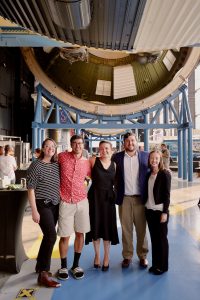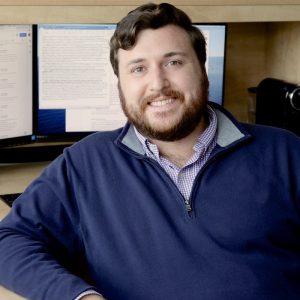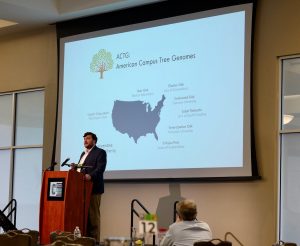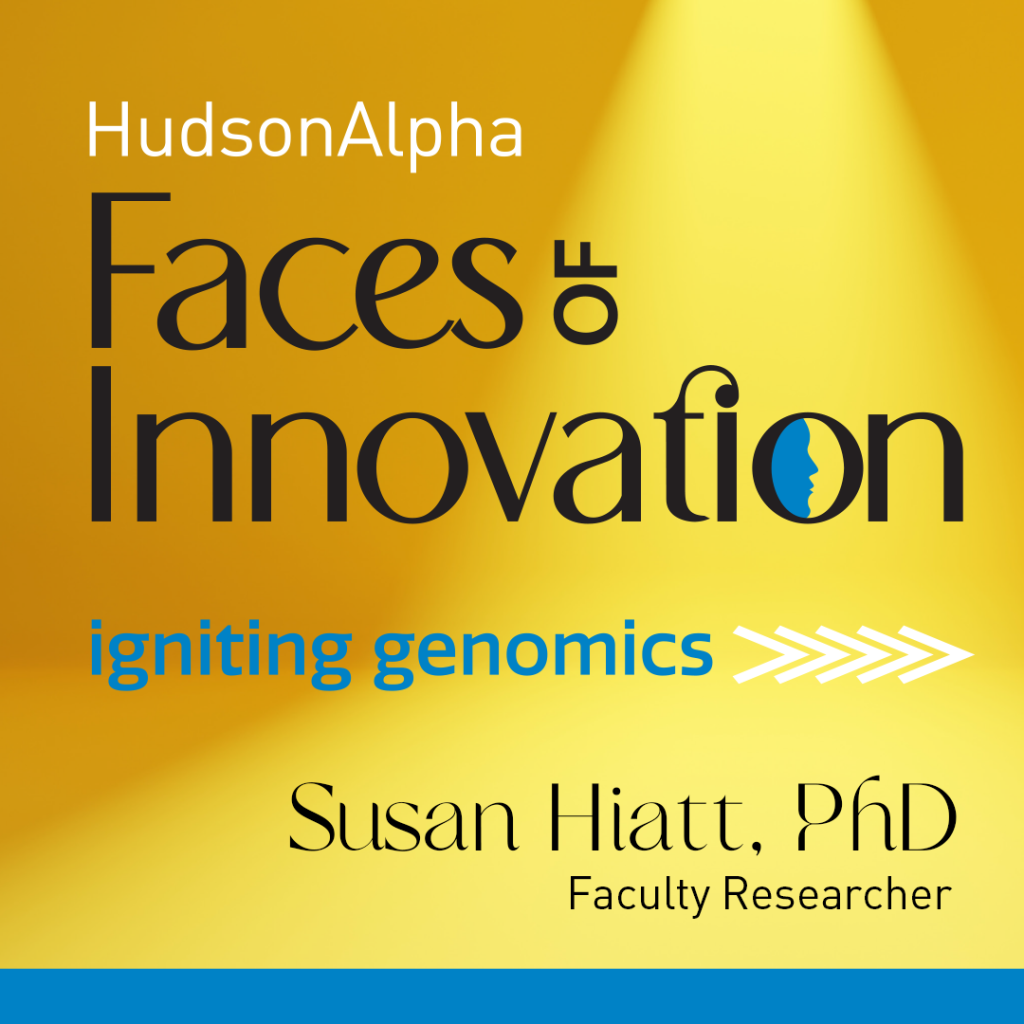Results from the study could revolutionize crop breeding by creating more efficient breeding practices while training the next generation of plant scientists
Alex Harkess, PhD, joined the HudsonAlpha Institute for Biotechnology in March 2020, just as the world was shutting down due to the COVID-19 pandemic. Although the work-from-home period slowed down the physical opening of his lab, Harkess still managed to put together a lab team that is thriving today.
Almost three years into his tenure at HudsonAlpha and Harkess’s hard work and dedication to his field of study have paid off. Dr. Harkess was recently awarded a five-year, $1.6 million National Science Foundation (NSF) CAREER grant entitled, “Characterizing the repeated evolution of dioecy in plants to engineer artificial chromosomes.” The Faculty Early Career Development (CAREER) Program supports early-career faculty who have the potential to serve as academic role models in research and education and lead advances in the mission of their organization.
This single-investigator grant will support Harkess and several lab personnel as they explore sex chromosome evolution, engineer artificial sex chromosomes in plants, and train the next generation of plant scientists at college campuses across the country.
“This grant is the culmination of some impossibly big ideas from the last fifteen years I have studied sex chromosomes, which have been made possible by a kind network of mentors and collaborators, my growing laboratory of excellent scientists, and my experiences and personal growth here at HudsonAlpha,” says Harkess.
Interrogating sex chromosome systems to engineer a novel hybrid plant breeding system
The majority of flowering plant species are hermaphroditic, producing flowers having both male and female reproductive organs that can reproduce with themselves. However, roughly ten percent of flowering plants are dioecious, producing separate male and female plants that must reproduce through cross-pollination.
Commercially, the sex of individual dioecious plants is important for food production because, in many crops, like melon, squash, strawberries, and grapes, only female flowers make fruits. Within individual species, sometimes one sex is also more commercially valuable because it carries desirable traits, like better taste or faster growth. For example, brewers only use female hop cones for producing beers, and male asparagus plants are more desirable since they don’t make seeds.

Members of the Harkess lab (L to R- Postdoctoral fellows Dr. Sarah Carey and Dr. Alan Yocca, graduate student Laramie Akozbek, Dr. Alex Harkess, and undergraduate student Caroline Bendickson
The ability to determine the sex of dioecious plants earlier in their lifecycle or to engineer a specific sex within an individual plant would give plant breeders and growers an advantage, saving them time, money, and other resources. Dr. Harkess has spent much of his career trying to pinpoint the genetic changes that make a plant male, female, or hermaphroditic. Genetics plays a huge role in sex determination systems in plants.
In plants, dioecy is often controlled by a sex chromosome pair, where one chromosome (the Y in the XY system and the W in the ZW system) determines maleness or femaleness, respectively. Within sex chromosomes exist certain genes that determine the sex of each individual. Knowing these genes would allow for the direct engineering of male or female plants. However, sex chromosomes are extremely hard to characterize genetically.
“In plants, sex chromosomes are hard to identify because they’re often indistinguishable from regular chromosomes, meaning you can’t just look at them under a microscope and find the sex chromosome,” says Harkess. “Further complicating the matter, sex chromosomes are difficult to assemble because they differ entirely from species to species. My lab has developed a pipeline called Cytogenetics-by-Sequencing (CBS) to more easily and inexpensively identify and characterize sex chromosomes in plants. We’ve successfully used the CBS pipeline on 17 dioecious species so far, allowing us to produce the largest-ever and highest resolution genomic dataset for sex chromosomes.”
Using their new pipeline, Harkess’s lab aims to characterize sex chromosomes and sex-determining genes across every order of flowering plants, the largest genomic sampling of dioecious plant species to date. The immense amount of data produced by the group will serve as an invaluable resource for plant breeding. Harkess’s team plans to use the information to identify new genes that control sex in plants and engineer artificial sex chromosomes to genetically modify hermaphroditic crops.
“By leveraging the knowledge we will learn about the evolution of sex chromosomes and sex-determining regions of dioecious plants, we plan to develop a novel type of plant hybrid production,” says Harkess. “We will use CRISPR-based techniques to convert a “normal” chromosome in a hermaphroditic crop into an X/Y or Z/W sex chromosome pair, allowing us to control the sex of flowers in crop species”
Breaking STEM barriers caused by inequity in access to undergraduate research experiences
If you take a trip to the Harkess lab, you’ll be greeted with many young, smiling faces. The lab employs and trains young plant scientists ranging from post-doctoral fellows to graduate students to the occasional high school intern. Dr. Harkess is passionate about mentoring students, and his new grant will ensure that passion is not confined within the walls of his own lab. His new NSF grant will partially fund a training program called the American Campus Tree Genomes (ACTG) project, which was born in 2020 out of a crowd-funding event at Auburn University.
Through ACTG, Harkess and Les Goertzen, PhD, a colleague at Auburn University, developed a semester-long curriculum for undergraduate and graduate students at Auburn to assemble, annotate, and publish college campus tree genomes as a cohort. During the pilot semester in 2021, students sequenced Auburn’s beloved Toomer’s Oak tree. The course was a success – all of the students successfully contributed to the release of the Quercus virginiana southern live oak genome, despite 70 percent having never written a manuscript, performed command line bioinformatics, or engaged in plant genomics molecular work,
“The program minimizes institutional barriers using the PRAXIS-AI teaching platform, which is entirely internet browser-based,” says Harkess. “It also allows teaching and learning to occur in non-traditional settings. If students can access the internet, they can do the coursework. We want students anywhere in the world to be authentically trained in plant genomics, with access to the latest technologies, to ultimately broaden their scientific networks and career prospects.”
Harkess and Goertzen built a framework so that other institutions can easily replicate the experience, from the crowdsource funding to the educational products to the actual science itself. The ACTG program expanded to two partner institutions in 2022: Washington State University students, led by Dr. Stephen Ficklin, are sequencing the Cosmic Crisp Apple tree, and University of South Carolina-Aiken students, led by Dr. Nathan Hancock, are sequencing the Sabal palmetto. Six more schools are already on board for fall 2023. With the help of the NSF grant, Harkess hopes to expand the program to reach 100 students per year, with an emphasis on including HBCUs and community college students.
Byline: Sarah Sharman, PhD, Science writer



